Donald Trump ("Hush Money") Trial (2024): An Account
by Douglas O. Linder
It had never happened before. No American president or former president had ever faced a criminal trial. But in the Spring of 2024, in the middle of tight presidential race pitting President Joe Biden against former president Donald Trump, Trump faced trial in a New York City courtroom in a case that could well decide the outcome of the presidential election.
Background
In September 2005, Donald Trump, several months into his marriage to his third wife, Melania, and Billy Bush, emcee of “Access Hollywood” and later co-host of NBC’s “Today” show, bantered in a bus as they rode to a Los Angeles studio where Trump was scheduled for a cameo appearance on the soap opera “Days of Our Lives.” Their vulgar conversation about groping and having sex with women was captured on a hot mic. In the audio, Trump discusses a failed attempt to seduce a woman. “I moved on her, and I failed. I’ll admit it,” he says. “I did try and f--- her.” Trump adds. “I moved on her like a bitch, but I couldn’t get there. And she was married.”
Then Trump notices Arianne Zucker, the actress who is waiting to escort them into the soap-opera set.
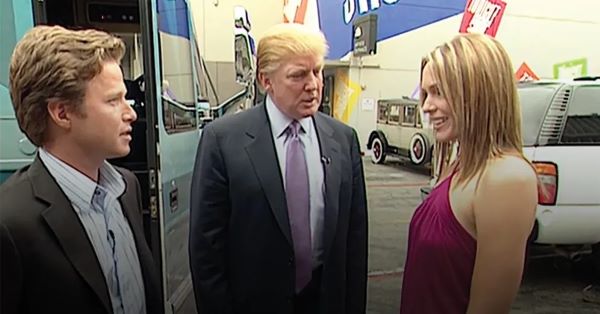
Billy Bush, Donald Trump, and Arianne Zucker in 2005 (Access Hollywod)
“Your girl’s hot as s---, in the purple,” says Bush.
“Whoa!” Trump says. “Whoa! I’ve got to use some Tic Tacs, just in case I start kissing her. You know I’m automatically attracted to beautiful — I just start kissing them. It’s like a magnet. Just kiss. I don’t even wait.”
“And when you’re a star, they let you do it,” Trump says. “You can do anything.”
“Whatever you want,” replies Bush.
“Grab them by the p---y,” Trump says. “When you’re a star, they let you do it. You can do anything.”
Eleven years later, in October 2016, just three weeks before Election Day in a presidential race pitting Trump against Hillary Clinton, the so-called “Access Hollywood tape” (including video) was posted online. The release of the tape shocked the nation and sent the Trump campaign into damage control mode.
Soon after the video appeared online, Clinton wrote on Twitter: “This is horrific. We cannot allow this man to become president.”
Trump, not known for making apologies, apologized: “This was locker-room banter, a private conversation that took place many years ago. Bill Clinton has said far worse to me on the golf course — not even close,” Trump said in a statement. “I’ve never said I’m a perfect person, nor pretended to be someone that I’m not. I’ve said and done things I regret, and the words released today on this more than a decade-old video are one of them. Anyone who knows me knows these words don’t reflect who I am.”
Hope Hicks, a young star on Trump’s staff knew that the vulgar tape spelled trouble for the campaign as soon as she read the transcript. “This was a crisis,” she would tell jurors in Trump’s 2024 criminal trial.
The last thing the campaign wanted in the days before the election was another damaging story that could further erode his support, especially among female voters. And there was, Trump knew, another story out there that could be a death blow to his chances: a story about an affair with an adult-film star not long after his wife Melania had given birth.
In July 2006, Trump played in a celebrity golf tournament in Lake Tahoe. Adult film studio Wicked Entertainment sponsored one of the holes. It was at the Wicked-sponsored hole that actress Stormy Daniels (whose real name was Stephanie Clifford) first met Donald Trump, posing with him for a picture. The two met again later met in the “gift room” of the clubhouse where Trump asked Daniels for a DVD. She presented him with the video “3 Wishes”, which she wrote, directed, and starred in. Minutes later, a Trump bodyguard asked Daniels if she would like to meet Trump for dinner. “F--- no!” she remembered later saying at the time, but she took the bodyguard’s cell number. Later, at the urging of her publicist who saw possible benefits for her career, Daniels changed her mind and agreed to meet Trump at Harrah’s hotel, where he was staying during the tournament.
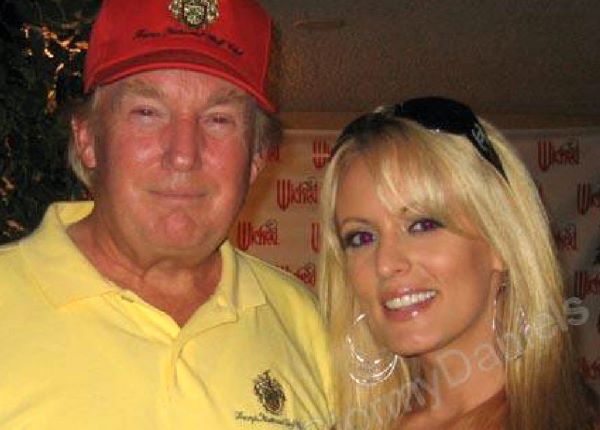
Donald Trump with Stormy Daniels in Lake Tahoe in 2006 (My Space/Stormy Daniels)
As Daniels later told the story, when she entered Trump’s penthouse suite, she was greeted by Trump wearing a pair of “silk or satin pajamas.” She asked him to change and then the two sat down for a two-hour conversation than covered topics ranging from Daniels’ personal history to the workings of the adult film industry, to the possibility of Daniels making an appearance on the television show “The Apprentice” in which Trump played the star role. Trump promised that if she appeared, he could fix the show to allow her to make “a good showing.”
Daniels rose to go to the bathroom. When she came out, she was surprised to find Trump on the bed wearing only a t-shirt and boxers. Daniels remembered feeling “the room spin in slow motion”—but ended up in bed “staring at the ceiling” and “trying to think about anything other that what was happening here” as the two had sex. “Let’s get together again honey bunch,” Trump said as she got up to leave. “We were great together.” Over the next several months, Trump would continue to call Daniels “an average of about once a week.”
Nine years later, after the “Access Hollywood” tape hit the news, Gina Rodriquez, the agent for Daniels, saw an opportunity for her client to tell her Lake Tahoe story—and, in so doing, put an end to physical threats that had been made against her as early as 2011, when she first agreed to talk about it with a reporter for the tabloid In Touch. (Out of fear for her own safety, Daniels saw to it that the In Touch story was pulled.)
On October 8, 2016, David Pecker, owner of American Media Inc. (AMI) and publisher of the National Enquirer, learned from Dylan Howard, editor-in-chief at the National Enquirer, that a story about the Trump-Daniels affair being shopped to potential news sources. Pecker was a big Trump supporter. When he visited with Trump and his lawyer Michael Cohen early in the presidential campaign, Pecker promised them that he would be “the eyes and ears” of the campaign, always on the lookout for potential negative stories about Trump—especially those involving women—and that he would do his best to “kill them.” In fact, Pecker had been doing just that. He paid $30,000 to kill a story by a Trump Tower doorman about Trump fathering an illegitimate child with a hotel maid, a story that seemed not even to be true. He also made sure, with a payment of $150,000, that a story about Trump’s year-long affair with Playboy model Karen McDougal never saw the light of day.
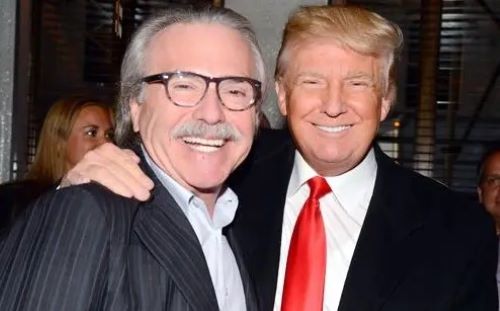
David Pecker and Donald Trump (Patrick McMullen.com)
Now he could do the same with the Stormy Daniels story, but Pecker did not want to make the $130,000 necessary to buy and bury the story. Pecker told Trump lawyer Michael Cohen that he had already paid $180,000 to kill two negative stories and “I’m not a bank.” Besides, he was worried that paying off a porn star might comeback to haunt his company, which depended on family-friendly Walmart as the biggest distributer of his magazine.
Michael Cohen knew that the publication of the Stormy Daniels story would be, in his words, “catastrophic—horrible for the campaign.” Cohen immediately went to Trump’s office to inform him of the situation.
Trump told Cohen about meeting Stormy Daniels when he was playing golf with Big Ben Roethlisberger, the football player. He told Cohen that women preferred him over even a famous football player like Big Ben. Trump did, however, recognize the gravity of the situation. According to Cohen, Trump said: “This is a disaster, total disaster. Women are going to hate me. . . Guys may think it's cool, but this is going to be a disaster for the campaign.” He told Cohen, “Just take care of it.”
If Pecker would not write the check to buy and kill the story, Cohen needed to come up with another plan. He drafted a non-disclosure agreement under which Daniels would be paid $130,000 and obligated to pay $1 million dollars for violating the agreement.
But Cohen, at Trump’s urging, tried to delay payment until after the election, when the story wouldn’t matter and the payment in fact might never have to be made. Sensing what Cohen was up to, the lawyer for Daniels, Keith Davidson, announced he would take the story to the Daily Mail. The possibility of the story coming out in the Daily Mail sent Cohen into panic mode and October 17 he left a voicemail on Trump’s vote letting him know they needed to act now. The next day, in a phone conversation, Trump told Cohen: “Just do it. Go meet up with Allen Weisselberg (Trump’s CFO) and figure this whole thing out.”
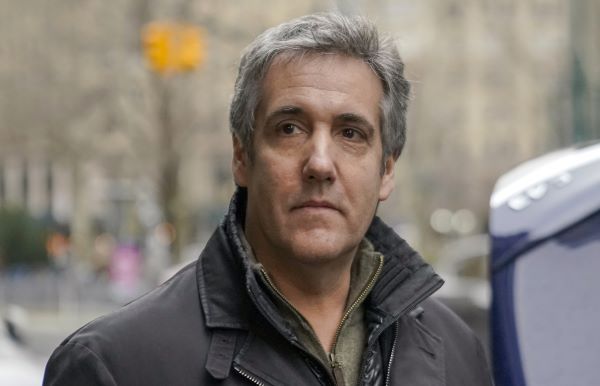
Michael Cohen (Mary Altaffler/AP
Cohen and Weisselberg met to discuss options that would keep Trump’s fingerprints off the non-disclosure agreement. Given the urgency of the situation, Cohen agreed he would pay for the NDA himself and hope to get reimbursed in some way by Trump or the Trump organization in some way. Weisselberg said, “Don't worry about it, I will make sure you get paid back.” Weisselberg and Trump shortly afterwards talked with Trump and told them of the plan. “Good, good,” he said, adding, “You will get your money back.”
On October 26, 2016, Cohen established an LLC called “Essential Consultants”, ostensibly as a real estate consulting company to collect fees for consultation fees he received for real estate work. What Cohen stated on the filing receipt necessary to open the LLC account was not true. The real purpose of the LLC was to pay Stormy Daniels for a NDA. The next day, Cohen wired $130,000 from the LLC’s account at First Republic to the lawyer for Stormy Daniels.
Cohen would be reimbursed—eventually. Reimbursement was disguised through payment for his “future legal services as personal counsel” to the president. There was no retainer agreements. The checks signed by Trump, mostly in the Oval Office, were falsely labeled in Trump organization business records in New York.
Falsifying business records is a crime, but only a misdemeanor unless the records were falsified in furtherance of some other crime—and a New York law made it a crime to illegally conspire to aid in a candidate’s election. The connection between the falsification of business records and a conspiracy to aid in Trump’s presidential election became the basis for turning what would otherwise be a misdemeanor prosecution into a felony prosecution. To some critics, such at Ross Douthat of the New York Times, the notion of someone being potentially “sent to prison for a misdemeanor offense elevated by a second crime for which he isn’t even being charged” was “somewhat Kafkaesque.”
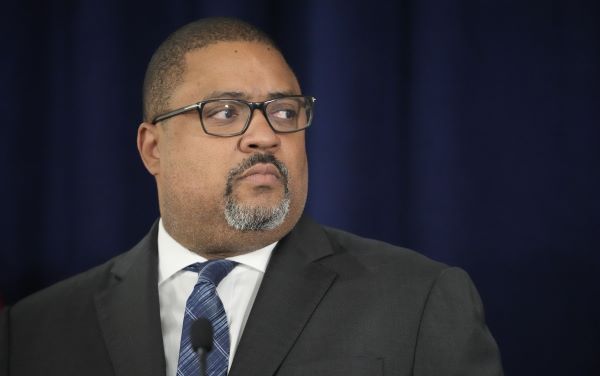
Alvin Bragg, Manhattan D.A. (Mary Altaffler/AP)
In March of 2023, Alvin L. Bragg, Manhattan district attorney, secured a 34-count indictment against Trump, making him the first prosecutor ever to charge an American president. While Trump would soon face three other indictments related to his conduct while in office (all significantly more serious than this falsifying business records case), the New York case would be the first case to go to trial.
The Trial
On Monday, April 15, 2024, the first ever criminal trial of an American president opened in a Manhattan courthouse before Judge Juan M. Merchan. Trump arrived wearing a blue suit, red tie and US flag lapel pin. Hordes of reporters and television cameras greeted him, outnumbering a relatively small number of supporters and protesters. Trump told reporters his trial was an “assault on America” and “political persecution.”
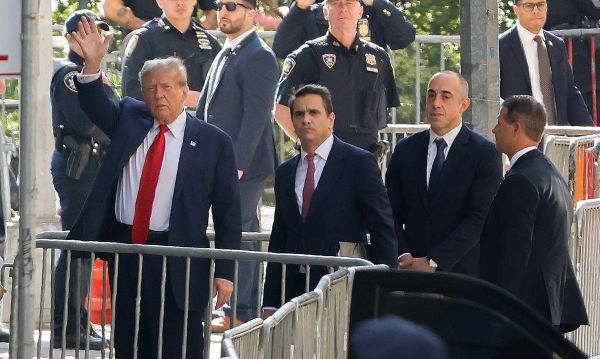
Donald Trump arriving at courthouse for first day of his "hush money" trial (Stefan/AP)
Inside the courthouse, prosecution and defense teams began jury selection, a difficult process in a case involving such a well-known and polarizing defendant.
As jury selection continued a second day, Trump called Judge Merchan “a Trump-hating judge.” Once during jury selection, as a prospective juror was question about a social media post that suggested she supported President Biden, Trump muttered something, angering Justice Merchan. “I will not have any jurors intimidated in this courtroom,” the judge said.
By the end of Day 3, a jury of seven men and five women was seated. Once both teams of lawyers used up their respective 10 peremptory strikes, things moved quickly, with the judge rejecting defense challenges for cause against jurors who had expressed negative opinions about Trump, but who had insisted that could keep an open mind and base their verdict on the evidence. The juror selected to be foreperson was a married man born in Ireland who works in sales. He reads the New York Times and Daily Mail, and also watches Fox News and MSNBC. One of the other jurors was an investment banker who said he follows Trump's TruthSocial posts as well as Michael Cohen’s posts on X, formerly known as Twitter.
The first week of the trial ending with a shocking event. As the 12 jurors and 6 alternate jurors were being sworn in, a 37-year-old man set himself on fire outside the courthouse. Reporters rushed out of the courtroom to witness the disturbing scene outside.
On April 22, lawyers for both sides presented their opening arguments. Prosecutor Matthew Colangelo said Donald Trump committed election fraud and said the case was really about unlawfully interfering in the 2016 presidential election. Defense lawyer Todd Blanche said his client was innocent. There is nothing illegal about making a hush money payment, he said. People do it all the time. He also called principal prosecution witness Michael Cohen a liar, suggesting the jury should be skeptical of anything Trump's former lawyer says.
Prosecution Case: David Pecker Testimony
The prosecution’s first witness was David Pecker, the former head of American Media Inc., a parent company for the National Enquirer. Pecker described for jurors the "catch-and-kill" plan designed to aid Trump’s election campaign. He described his purchase—to “lock it up”—of a false story from a Trump Tower doorman about a love child with a Tower maid. Pecker also testified about the Inquirer running negative pieces on Trump’s primary opponents. Prosecutors showed the jury a collection of Enquirer headlines that lauded Trump and disparaged his opponents, including "Bungling Surgeon Ben Carson Left Sponge in Patient's Brain" and "Donald Trump blasts Ted Cruz's Dad for Photo with JFK Assassin."
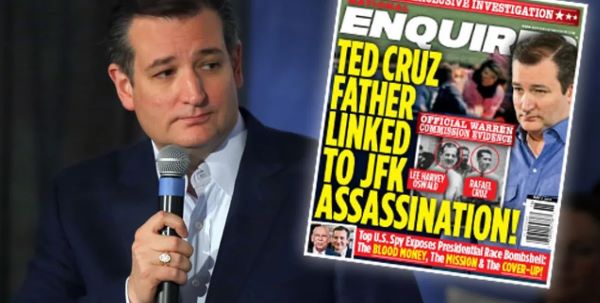
Senator Ted Cruz in 2015 and a National Enquirer cover story falsely linking his father to the JFK assassination
Pecker testified that in June 2016 learned that Playboy model Karen McDougal was trying to sell “a story about a relationship that she had with Donald Trump for a year." Pecker said he called Cohen to inform him, and that "Michael was very agitated." In a follow-up phone call with Trump, Pecker said he told Trump, "I said I think the story should be purchased and we should buy it. Mr. Trump said to me, 'I don't buy stories. Anytime you do anything like this, it always gets out.'" Pecker testified he paid McDougal $150,000 for her story. After the catch-and-kill of the McDougal story, Trump asked Pecker, ““How’s Karen doing?” during a White House visit. “I said she’s doing well, she’s quiet, everything’s going good.” Pecker said that Trump became furious in March 2018, when McDougal gave an interview to CNN’s Anderson Cooper. Calling Pecker on the phone, an angry Trump asked, “I thought you had and we had an agreement with Karen McDougal that she can’t give any interviews or be on any TV channels?” Pecker testified he explained to the president that the agreement had been changed to allow her to speak to the media. But Trump wasn’t happy about it.
Jurors, often with rapt attention, listened as Pecker recounted the frantic days following the release of the “Access Hollywood” tape when Pecker, Cohen, and others, with Trump’s full knowledge, raced to head off release of a story by Stormy Daniels of her golf club encounter with the Trump.
Pecker’s direct testimony ended with a question about whether he bears Trump any ill will. “On the contrary,” Pecker testified, “I felt that Donald Trump was my mentor. He helped me throughout my career.”
Pecker was followed to the stand by Rhona Graff, a longtime Trump assistant. Groff testified the Trump’s contact list included information for Stormy Daniels and Karen McDougal. Then Gary Farro, an executive at First Republic Bank, told the court how he helped Michael Cohen set up the bank account for the shell company, Essential Consultants, that he used to pay hush money to Stormy Daniels.
Criminal Contempt
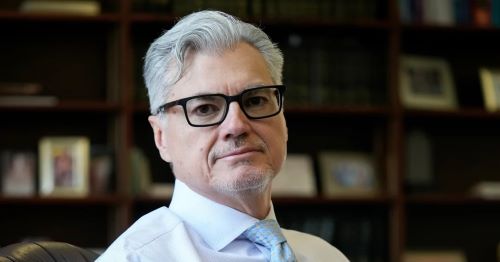
Judge Juan Merchan (Seth Wening/AP)
Day 9 of the Trump trial began with Judge Merchan holding Donald Trump in criminal contempt over his social media posts. Despite a gag order prohibiting him from attacking witnesses, jurors, and lawyers in the case, Trump had done just that. In one media post, Trump called Michael Cohen and Stormy Daniels “sleaze bags.” Merchan fined Trump $9,000 for his Truth Social and campaign posts found to be in violation of his April 1 gag order. The judge warned the former president that future violations could land him in jail.
The offending posts were taken down, but Trump railed against the gag order calling it “totally unconstitutional.” Hours after the contempt finding, Trump returned to his Truth Social platform to call the trial “RIGGED.”
Prosecution Case: Testimony of Keith Davidson, Hope Hicks, and Jeffrey McConney
When testimony resumed, Keith Davidson, an attorney who represented Daniels and Karen McDougal as they brokered hush money agreements, took the stand. He described for the court how he represented the two men and worked with Cohen to secure payments for their stories. Davidson testified that in both cases he initially assumed that Trump would ultimately be the person providing the money. Jurors were shown a November 2016 text message sent by Davidson to Dylan Howard, then editor-in-chief at the National Enquirer. “What have we done?” Davidson texted to Howard as election results came in. Howard texted back: “Oh my god.” The two men seemed to understand that the deals they reached killing the stories of Daniels and McDougal may have contributed to Trump’s victory.
Shortly after the 2016 texts were introduced into evidence, the court heard from Trump himself for the first time, albeit in taped form. Jurors listened to a recording covertly made by Cohen in September 2016 in which Cohen discussed the deal with McDougal. Trump asked how much the agreement would cost: “One-fifty?”[presumably meaning $150,000]. Trump suggests the payment be in cash, but Cohen argues a check would cause fewer problems.
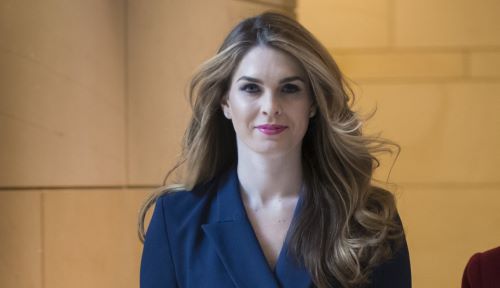
Trump advisor Hope Hicks (Applewhite/AP)
Prosecutors called Trump advisor Hope Hicks as a witness on Day 11 of the trial, and her testimony gave jurors their best window into how Trump reacted during the 2016 campaign to his growing list of sexual scandals. She also described Trump’s pleasure in seeing National Enquirer articles trashing his Republican primary opponents. Hicks testified she vividly recalled a phone conversation between Trump and Pecker in which Trum praised an article about medical malpractice allegations against Dr. Ben Carson and a negative story the magazine ran about Senator Ted Cruz. Hicks said he called one of the articles “Pulitizer worthy.”
Hicks testified that when she learned about the Access Hollywood tape “I was concerned, very concerned.” Trump agreed, she said, that the tape “wasn’t good,” but added it “was like two guys talking privately, locker room talk.” Hopes said that on November 4, just four days before the election, she received a request for comment from a Wall Street Journal reporter for a forthcoming story about American Media buying the rights to Playboy model McDougal’s story about an affair she had with Trump years earlier. Hicks said she contacted Jared Kushner, who had connections to Rupert Murdoch, owner of the WSJ, hoping he could persuade Murdoch to delay the story until after the election. “I was hoping to see if we could buy a little extra time to deal with this,” she said.
Hicks testified that Trump told her to deny to the WSJ reporter both the McDougal affair as well as porn actor Daniels’ claims of a sexual encounter with him, which was also mentioned in the article. The story, as it ran in the Journal, stated: “Hope Hicks, a Trump campaign spokeswoman, said of the agreement with Ms. McDougal: ‘We have no knowledge of any of this.’”
Hicks testified that Trump told her that Michael Cohen had paid the $130,000 in hush money to Daniels out of his own pocket. She said Trump told her, “he did it out of the kindness of his own heart.” Hope admitted, however, that doing something “out of the kindness of his own heart” seemed out of character when it came to Cohen: “I didn’t know Michael to be an especially charitable person or selfless person.” Hicks testified that Trump was glad the payment was made. He thought “it would’ve been bad to have that story come out before the election.”
The next day, Merchan hit Trump with another fine for criminal contempt, this time for saying in a broadcast show, “The jury was picked so fast. 95 percent Democrats. The area’s mostly all Democrat.” Merchan said, Trump’s comments “not only called into question the integrity, and therefore the legitimacy of these proceedings, but again raised the specter of fear for the safety of the jurors and of their loved ones.” Merchan added, “future violations of its lawful orders will be punishable by incarceration.”
Former Trump Organization controller Jeffrey McConney provided the first testimony that went straight to the heart of the indictment against Trump. He testified about the plan for reimbursing Michael Cohen for his $130,000 payment to kill the Stormy Daniels story.
For the first time, jurors are hearing about the reimbursements at the root of the falsifying business records charges against Trump. Former Trump Organization controller Jeffrey McConney has taken the stand. McConney’s own notes were shown in court. The notes indicated that Cohen would get $35,000 a month for 12 months [an amount that included reimbursement for taxes] and included the words: “wire monthly from DJT.” Asked by the prosecutor what that meant, McConney said: “that was out of the president’s personal bank account.” McConney testified he directed an accounting department employee to record the expenses for the first two payments in the general ledger as a payment to a lawyer for a “retainer” for the months of January and February 2017. McConney’s testimony was not sexy—in fact, it was downright boring—but legally it was some of the most important and relevant testimony, showing the source and the amount of the hush money reimbursement, as well as its mislabeling in the business records.
Prosecution Case: Stormy Daniels Testimony
On Day 13, Stormy Daniels began her much anticipated testimony, which included salacious details of her evening with Trump in Lake Tahoe. Prosecutor Susan Hoffinger asked Daniels, "At some point did you end up on the bed having sex with him?" "Yes," Daniels answered, "I had my clothes and my shoes off. I believe my bra was still on." "Was he wearing a condom?" Hoffinger asked. "No," Daniels replied. "Was that concerning to you?" Hoffinger asked. "Yes," Daniels said.
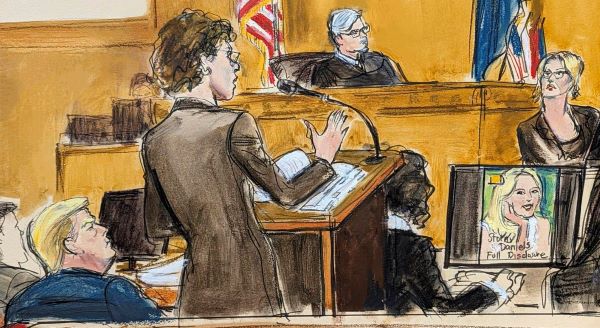
Defense attorney Susan Necheles cross-examines Stormy Daniels (Elizabeth Williams/AP)
As Stormy Daniels offered her explicit testimony, Trump repeatedly motioned for his attorney Susan Necheles to intervene. She did and Judge Merchan asked both parties to approach the bench. She sustained the objection. After Daniels completed her direct examination, Trump attorney Todd Blanche moved for a mistrial. He called Daniels' testimony "extraordinarily prejudicial." Prosecutors argued that Daniels' testimony was relevant. Judge Merchan rejected the defense motion, saying, "I don't believe we are at the point where a mistrial is warranted." He did note, however, “There are some things that would have been better left unsaid.”
On cross-examination, defense attorney Susan Necheles got Daniels to admit she “hated" Trump and "wanted him to be held accountable." "You call him names all the time, right?" Necheles asked. "You despise him." Daniels said Trump began the name-calling, calling her "Horseface" and "Sleazebag." When the defense attorney suggested she was lying about her sexual encounter with Trump, Daniels said, “If that story was untrue, I would have written it to be a lot better.”
Prosecution Case: Michael Cohen Testimony
Michael Cohen, Trump’s former lawyer, was the most important witness in the trial and the prosecution saved him to the end of its case. Cohen told jurors he was surprised and honored when Trump offered him a job. He said that in the ten years he worked with Trump, the two usually spoke multiple times each day. Cohen testified, “The only thing that was on my mind was to accomplish the task and make him happy.”
Cohen said Trump was well aware of his plan to personally pay off Stormy Daniels, including his setting up an LLC that would help cover up tracks. “Everything required Mr. Trump’s sign off,” Cohen told jurors.
Cohen testified he was unhappy about not being repaid for the $130,000 check he sent to kill the Stormy Daniels story, but that Trump called him in December 2016 and said “don’t worry about it” and he’d “take care of it.”
Shortly afterwards, Cohen met with the Trump Organization’s longtime CFO Allen Weisselberg to discuss getting paid back for the Daniels payment. Cohen testified he asked Weisselberg, “When am I getting the money back?” After Cohen provided Weisselberg with a copy of the bank statement showing the $130,000 transfer to Daniels’ lawyer, Weisselberg came up with a reimbursement plan that involved taking the money as income rather than a tax-free reimbursement and adding additional funds to cover his tax bill.
Prosecutor Hoffinger asked Cohen why he made an apology to the American public in 2019. Cohen said he apologized “For lying to them for acting in a way that suppressed information, that the citizenry had a right to know in order to make a determination on the individual who was seeking the highest office in the land.”
On the morning of Cohen’s cross-examination, Speaker Mike Johnson showed up outside the courthouse to denounce the proceedings as “all about politics.” He said of Cohen, “No one should believe a word he says today.” Johnson added, “I came here again today on my own to support President Trump because I am one of hundreds of millions of people and one citizen who is deeply concerned about this.”
On cross, defense lawyer Todd Blanche tried to show Cohen was biased against Trump. Blanche asked: “Yes or no: Do you want to see President Trump get convicted in this case?” “Sure,” Cohen replied. The defense tried to portray Cohen as a former Trump loyalist who was spurned by his ex-boss and then turned on him in an attempt to gain a reduced prison sentence for his own crimes. Blanche asked Cohen if he called Trump a “boorish cartoon misogynist” and “a Cheeto-dusted cartoon villain.” “Sounds like something I said,” Cohen replied. In response to questions, Cohen conceded that he wanted the prosecutors’ office to publicly acknowledge that he was cooperating in hopes of getting his sentence reduced. “I’m not trying to put words in your mouth. You wanted that?” Blanche asked. “Yes,” Cohen said.
After the day of cross-examination, Trump told reporters gathered outside the courthouse that he had a “very, very good day.” He said, “The trial is going very well.”
The following day, prosecutors played for the jury two clips of his podcasts in which he discussed Trump and his New York criminal case. In one clip for October 2020, Cohen said putting Trump in prison “won’t bring back the year that I lost or the damage done to my family. But revenge is a dish best served cold.” He adds: “You better believe that I want this man to go down.”
Defense Case
On May 20, the final day of the prosecution case, Judge Merchan ruled that a potential defense witness would not be allowed to testify as they hoped. The defense wanted to call a member of the Federal Election Commission to define terms relating to a “campaign contribution,” but said court rules prevented expert witnesses from interpreting the law.
The defense chose not to call Donald Trump to the stand, a move that surprised almost no one. In fact, the defense presented only two witnesses, their main witness being attorney Robert Costello, who once offered to represent Cohen. Costello said Cohen told him in 2018, “I swear to God, Bob, I don’t have anything on Donald Trump.” He also testified that Cohen said Trump “knew nothing” about the hush money paid to Stormy Daniels. “Michael Cohen said numerous times that President Trump knew nothing about those payments, that he did this on his own, and he repeated that numerous times.” After Costello finished his testimony, the defense rested.
Closing Arguments
On May 28, 2024, the prosecution and defense presented their closing arguments. Trump arrived at the courthouse with sons Donald Jr. and Eric, and daughter Tiffany. He told the assembled reporters, “We’ll see how it goes. This is a very dangerous day for America. It’s a very sad day.”
In his closing argument for the defense, attorney Todd Blanche told jurors, “President Trump is innocent. He did not commit any crimes and the district attorney has not met their burden of proof. Period.” He called Michael Cohen “a MVP of liars” whose testimony should be disregarded. “You cannot convict President Trump of any crime beyond a reasonable doubt on the word of Michael Cohen,” Blanche said. Blanche also ridiculed the prosecution’s theory that Trump conspired to influence the 2016 election in a way that was illegal. ”Every campaign in this country is a conspiracy to promote a candidate, a group of people who are working together to help somebody win.” He said the prosecution failed to proof Trump intended to defraud voters or anyone else. Do not, Blanche said, send Trump to prison based on the prosecution’s flimsy evidence.
After Blanche finished speaking, and before the closing argument for the prosecution, Judge Merchan told jurors that Blanche’s comment asking jurors not to send Trump to prison “was improper and you must disregard it.” He said sentencing is his job, not the jury’s.
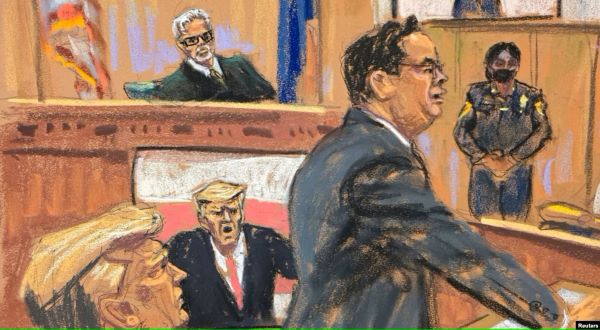
Assistant D.A. Joshua Steinglass makes his closing argument in the "hush money" trial (Reuters)
Closing for the state, Assistant District Attorney Joshua Steingless conceded that the testimony of Stormy Daniels was sometimes “cringeworthy” and “probably makes some of you uncomfortable to hear—but that’s kind of the point” because it “reinforces [Trump’s] incentive to buy her silence.” Steinglass said of Trump’s alleged records fraud: “In the simplest terms, Stormy Daniels is the motive.”
Steinglass acknowledged Cohen’s past lies and crimes. “We didn’t choose Michael Cohen to be our witness. We didn’t pick him up at the witness store,” Steinglass told jurors. “The defendant chose Michael Cohen to be his fixer because he was willing to lie and cheat on the defendant’s behalf.”
Steinglass tried to refute the defense argument that “every campaign in this country is a conspiracy to promote a candidate.” He told jurors that the goal of Trump and his fellow conspirators was “to manipulate and defraud the voters, to pull the wool over their eyes in a coordinated fashion.” It might have worked. “This scheme, cooked up by these three men, could very well be what got President Trump elected,” Steinglass said.
Steinglass said the business records claiming that payment to Cohen in 2017 were for legal services were obviously false. “Mr. Cohen spent more time being cross-examined at this trial than he did doing legal work for Donald Trump in 2017,” Steinglass said. He asked jurors to return a guilty verdict and show no man is above the law.
Verdict
After receiving Judge Merchan’s instructions, the jury began its deliberations on May 29. At one point, the jury sent a note asking to be re-read testimony from David Pecker about a phone conversation he had with Trump about the purchase of the rights to the life story of former Playboy model Karen McDougal. They also asked for Pecker’s testimony about a Trump Tower meeting that included Michael Cohen.
About 4:30 on the second day of its deliberations, the jury sent a note to the judge. When Judge Merchan took a seat on the bench and announced that the jury had reached a verdict, a collective gasp could be heard in the courtroom. The foreperson, Juror #1, asked whether the jury had reached a verdict, replied “Yes.” Then, asked what that verdict was for each of the 34 counts, the foreperson answered “Guilty.” Guilty on all 34 counts. When each of the other 11 jurors were polled and asked, “Is that your verdict?”, each answered, “Yes.”
Judge Merchan thanked the jurors for their service in a “very stressful and difficult task.” He set sentencing for July 11.
Sentencing and Trial Aftermath
The next day, in a press conference at Trump Tower, the former president denounced the verdict. “Just so you understand, this is all done by Biden and his people,” Trump said.
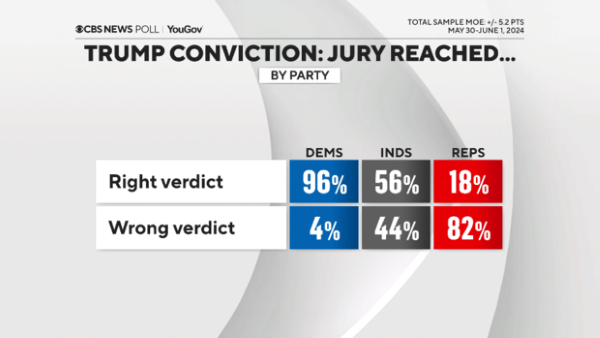
In a poll taken in the two days after the verdict, 57% of the respondents thought the jury got it right, which 43% called the jury’s verdict “wrong.” Predictably opinions differed sharply by party, with 96% of Democrats, and only 18% of Republicans, saying the verdict was right (CBS/YouGov). Polls taken about the same time also showed, for the first time in months, President Biden had overtaken Donald Trump by small margins in the key battleground states of Wisconsin, Michigan, and Pennsylvania. But within a week, Trump regained his lead--and a month later, Biden dropped out of the race.
Sentencing in the Trump "hush money" trial was set for July 11, 2024, then postponed until at least September after a U.S. Supreme Court decision establishing a presumption of immunity for actions by a sitting president, as well as absolute immunity for "official acts." In September, sentencing was postponed yet again, this time until after the November election. After Donald Trump swept all swing states to win the presidential election, Judge Merchan indefinitely postponed sentencing. His action allowed Trump's lawyers to file a motion to dismiss based on the Supreme Court's broad grant of immunity for actions of presidents. Two other cases brought against Trump by Special Counsel Jack Smith, one involving misuse of classified documents and a second for election interference, were dropped given the impossibility of trying the cases during the coming second Trump presidency.
On January 3, 2025, Judge Merchan issued an 18-page opinion denying Trump's motion to dismiss the charges based on his immunity claim.
After the Supreme Court rejected, on a 5 to 4 vote, efforts by Trump lawyers to block sentencing, Trump was sentenced without penalty on January 10, 2025. President-elect Trump appeared virtually. Judge Merchan stated he decided to give Trump an unconditional discharge because it was the only way to avoid encroaching on presidential duties and prerogatives. Merchan said the protections of the presidency were not, however, a "mitigating factor" and that they did not "reduce the seriousness of the crime or justify its commission in any way." Trump spoke for six minutes, denouncing the case and claiming his innocence. "I just want to say, I think it's an embarrassment to New York," Trump added. Soon after the sentencing hearing, Trump posted on social media another condemnation of his trial: "THERE IS NO CASE, THERE NEVER WAS A CASE."
